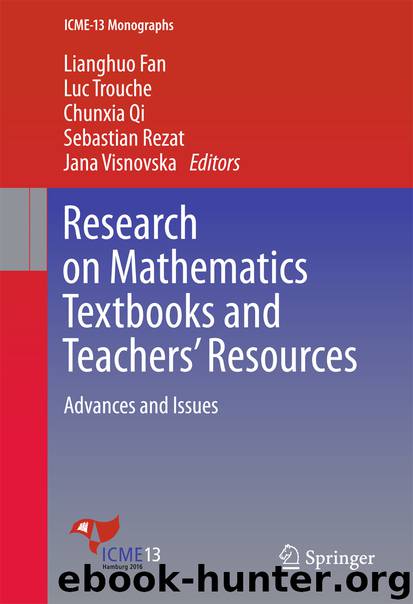Research on Mathematics Textbooks and Teachers’ Resources by Lianghuo Fan Luc Trouche Chunxia Qi Sebastian Rezat & Jana Visnovska

Author:Lianghuo Fan, Luc Trouche, Chunxia Qi, Sebastian Rezat & Jana Visnovska
Language: eng
Format: epub
Publisher: Springer International Publishing, Cham
8.6 Discussion
Within mathematics education, analytical approaches have been developed for conceptualizing use of resources (e.g., Gueudet and Trouche 2009; Remillard et al. 2009) and collegial interactions (e.g., Visnovska and Cobb 2013). Moreover, some scholars have started to explicitly combine these strands of research to understand how teams of teachers use, draw upon and redesign resources in different social practices (e.g., Gueudet et al. 2013; Gueudet and Trouche 2012). We used the two analytical perspectives of Halliday and Wenger as a starting point for conceptualizing the meaning potential of curriculum resources and teachers’ negotiation of meaning around these resources. In the following paragraphs, we will discuss the pros and cons of our analytical approach, with an orientation toward further refinement of the approach and a particular focus on the characterization of the resources, the negotiation of meaning around these resources, and potential influential characteristics of the teacher group and school context.
Applying Halliday’s metafunctions to the analysis of the curriculum resources enabled us to focus on the central ideas advocated by the resources, how these ideas are accomplished through the resources’ construction and coherence, as well as how the resources and the readers are positioned in relation to the central ideas. Such a conceptualization of the curriculum resources facilitated our analysis of how resources might mediate the teachers’ negotiation of meaning. More in particular, our approach to describe the texts’ ideational and textual metafunctions by means of identifying the central ideas and characterizing the type of text respectively was helpful in this regard. We could, however, not trace back the observed differences in negotiation of meaning to our approach of describing the texts’ interpersonal metafunction. Therefore, we hypothesize that, in addition to describing how the text and the reader are positioned in relation to the central ideas, it might be interesting in subsequent analyses to describe how the texts position the readers in relation to other readers. In other words, it might be helpful to analyze how a text, through its interpersonal metafunction, provides opportunities to build and strengthen the relationships between teachers in the group.
Our approach to capture the group’s negotiation of meaning around the three central ideas centered on describing the group’s participation around and reification of the central ideas. Characterizing participation by means of the key community issue for where we situated the group of teachers regarding the stages of community development (Wenger et al. 2002) was helpful. Describing both the quantity of teachers involved in the discussion and whether or not teachers actively connected the discussion to their own classroom experiences helped us to understand differences concerning the group’s participation around the three central ideas. We hypothesize that, as the group proceeds further in this professional development project, we will be able to describe the group’s participation not only quantitatively but also qualitatively, characterizing participation in more detail. We characterized the group’s reification in relation to the central ideas by describing when the group referred to the central ideas. Although doing so enabled us to observe differences related to the three ideas, this aspect has to be developed in more detail.
Download
This site does not store any files on its server. We only index and link to content provided by other sites. Please contact the content providers to delete copyright contents if any and email us, we'll remove relevant links or contents immediately.
| Arts & Humanities | Health |
| Language Arts | Library Skills |
| Mathematics | Reading & Phonics |
| Science & Technology | Social Studies |
The Art of Coaching Workbook by Elena Aguilar(48389)
Trainspotting by Irvine Welsh(20100)
Twilight of the Idols With the Antichrist and Ecce Homo by Friedrich Nietzsche(17729)
Fangirl by Rainbow Rowell(7857)
Periodization Training for Sports by Tudor Bompa(7349)
Change Your Questions, Change Your Life by Marilee Adams(6676)
This Is How You Lose Her by Junot Diaz(5812)
Grit by Angela Duckworth(4755)
Red Sparrow by Jason Matthews(4699)
Asking the Right Questions: A Guide to Critical Thinking by M. Neil Browne & Stuart M. Keeley(4613)
Paper Towns by Green John(4185)
Room 212 by Kate Stewart(4127)
Ken Follett - World without end by Ken Follett(3986)
The Sports Rules Book by Human Kinetics(3606)
Housekeeping by Marilynne Robinson(3431)
The Motorcycle Diaries by Ernesto Che Guevara(3354)
Introduction to Kinesiology by Shirl J. Hoffman(3312)
Exercise Technique Manual for Resistance Training by National Strength & Conditioning Association(3311)
Double Down (Diary of a Wimpy Kid Book 11) by Jeff Kinney(3293)
